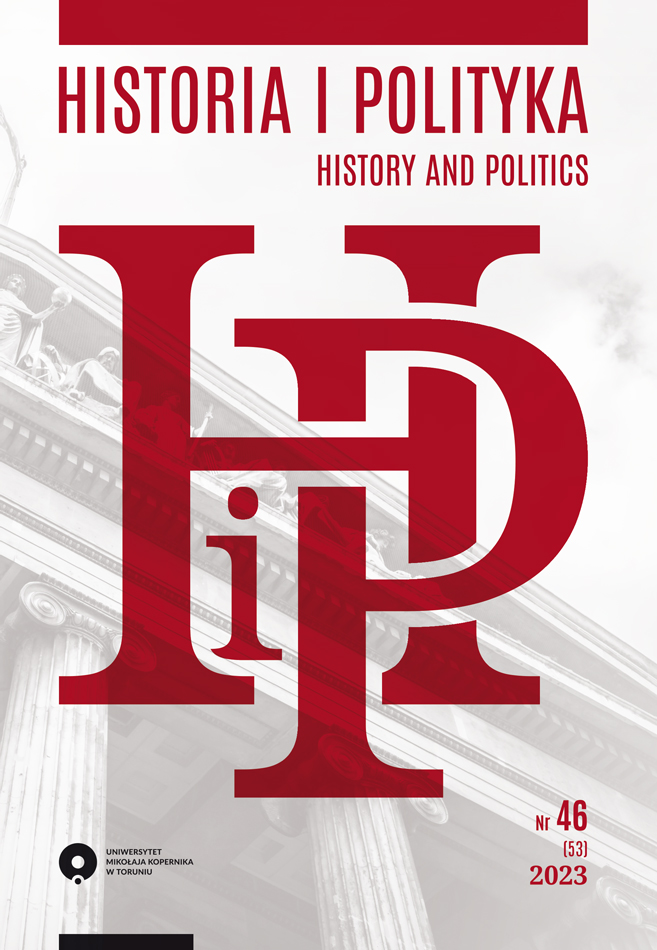Exploring the Role of Propaganda in Shaping National Identity and International Relations: A Comparative Analysis of Azerbaijan, Lithuania, and Turkey in the 21st Century
DOI:
https://doi.org/10.12775/HiP.2023.035Keywords
propaganda theories, national identity, international relations, Caspian and Baltic regions;, media and public opinionAbstract
This study investigates the application of contemporary propaganda theories in analyzing national identity and international relations in the Caspian and Baltic regions during the 21st century. Focusing on the contrasting views of Lippmann, Bernays, and Chomsky, the research explores the relevance of their approaches in the digital age and the role of propaganda in shaping public opinion in Azerbaijan, Lithuania, and Turkey. Employing qualitative methods, the study identifies the significance of Lippmannian and Bernaysian propaganda approaches in these countries, while highlighting the limitations of Chomsky’s perspective in promoting national identity-building and international relations. The research underscores the importance of critical thinking, expert guidance, and understanding the philosophical underpinnings of propaganda theories in navigating complex issues surrounding national identity and international relations. The findings contribute to a deeper understanding of the relationships between media, power, and public opinion, emphasizing the need for a context-specific approach to analyzing the role of propaganda.
References
Aliyev, A. (2019). Cultural Diplomacy in Azerbaijan: Bridge between the East and the West. Journal of Cultural Diplomacy, 1(1), 34–48.
Allen, K. (2007). The Corporate Takeover of Ireland. Newbridge: Irish Academic Press.
Azerbaijan–EU Relations. (n.d.). Ministry of Foreign Affairs of the Republic of Azerbaijan. Retrieved April 18, 2023, from: https://mfa.gov.az/en/category/regional-organisations/relations-between-azerbaijan-and-european-union.
Azerbaijan–Lithuania Relations. (n.d.). Embassy of Azerbaijan in Lithuania. Retrieved April 18, 2023, from: https://azembassy.lt/az-lt-relations.
Azerbaijan’s Media Landscape: Examining the Influence of Concentrated Ownership. (n.d.). Center for International Media Assistance. Retrieved April 18, 2023, from: https://www.cima.ned.org/publication/azerbaijans-media-landscape-examining-influence-concentrated-ownership/.
Azernews. (2023, April 14). Azerbaijan, Lithuania Discuss Prospects for Development of Bilateral Relations. Azernews. Retrieved from: https://www.azernews.az/nation/205111.html.
Bagdikian, B.H. (2004). The New Media Monopoly: A Completely Revised and Updated Edition with Seven New Chapters (20th Ed.). Boston: Beacon Press.
Baker, C.E. (2006). Media Concentration and Democracy: Why Ownership Matters. Cambridge: Cambridge University Press.
Bereiter, C. (1994). Implications of Postmodernism for Science, or, Science as Progressive Discourse. Educational Psychologist, 29(1), 3–12. DOI: 10.1207/s15326985ep2901_1.
Bernays, E.L. (2005). Propaganda. New York: Ig Publishing.
Carey, A. (1997). Taking the Risk Out of Democracy: Corporate Propaganda versus Freedom and Liberty. Champaign, IL: University of Illinois Press.
Carey, J.W. (2009). Communication as Culture, Revised Edition: Essays on Media and Society (2nd Ed.). London: Routledge.
Chomsky, N. (2002). Media Control: The Spectacular Achievements of Propaganda. New York: Seven Stories Press.
De Waal, T. (2013). Black Garden: Armenia and Azerbaijan through Peace and War (2nd Ed.). New York: NYU Press.
Fuchs, Ch. (2019). Propaganda 2.0: Herman and Chomsky’s Propaganda Model in the Age of the Internet, Big Data and Social Media. In: J. Pedro-Carañana, D. Broudy, & J. Klaehn (Eds.). The Propaganda Model Today: Filtering Perception and Awareness (pp. 71–91). London: London University of Westminster Press.
Gessen, M. (2017). The Future Is History: How Totalitarianism Reclaimed Russia. London: Granta Books.
Gunther, R., & Mughan, A. (Eds.). (2000). Democracy and the Media: A Comparative Perspective. Cambridge: Cambridge University Press.
Hallin, D.C., & Mancini, P. (2004). Comparing Media Systems: Three Models of Media and Politics. Cambridge: Cambridge University Press.
Ismailov, E., & Pipiya, L. (2016). Azerbaijan–Lithuania Relations: New Stage of Development. Baku: Center for Strategic Studies under the President of Azerbaijan.
Kaid, L.L. (Ed.). (2004). Handbook of Political Communication Research. London: Routledge.
Krippendorff, K. (2018). Content Analysis: An Introduction to Its Methodology (4th Ed.). Thousand Oaks, CA: Sage Publications.
Kuczyńska-Zonik, A. (2017). The Securitization of National Minorities in the Baltic States. Baltic Journal of Law & Politics, 10(2), 26–45. DOI: 10.1515/bjlp-2017-0011.
Lietuvos Respublikos Prezidentė. (n.d.). National Symbols. Retrieved from: https://www.lrp.lt/en/national-symbols.
Lippmann, W. (2004). Public Opinion. Vol. 1. Piscataway Township, NJ: Transaction Publishers.
Lithuanian Culture. (n.d.). Lithuanian Culture Institute. Retrieved April 18, 2023, from: https://english.lithuanianculture.lt/.
Mammadov, V. (2018). Azerbaijan’s Southern Gas Corridor: Bridging Europe and Asia. The Diplomat. Retrieved October 25, 2018, from: https://thediplomat.com/2018/10/azerbaijans-southern-gas-corridor-bridging-europe-and-asia/.
McChesney, R.W. (2013). Digital Disconnect: How Capitalism Is Turning the Internet against Democracy. New York, NY: The New Press.
Miller, M.C. (2002). The Bush Dyslexicon: Observations on a National Disorder. New York, NY: W.W. Norton & Company.
Mullen, A., & Klaehn, J. (2010). The Herman–Chomsky Propaganda Model: A Critical Approach to Analysing Mass Media Behaviour. Sociology Compass, 4(4), 215–229. DOI: 10.1111/j.1751-9020.2010.00275.x.
Patrick, T., & Werkhoven, S. (2017). An Analysis of John Stuart Mills’s Utilitarianism. Boca Raton, FL: CRC Press.
Schudson, M. (2011). The Sociology of News. New York, NY: W.W. Norton & Company.
State Symbols of Azerbaijan. (n.d.). Retrieved from: https://azertag.az/en/page/state-symbols-of-azerbaijan-92140.
Straw, W. (1996). Manufacturing Consent: Noam Chomsky and the Media, Part 1 (Thought Control in a Democratic Society) and Part 2 (Activating Dissent). [Review of the documentary film dir. by M. Achbar, & P. Wintonick, 1992]. Canadian Journal of Communication, 21(1), 141. DOI: 10.22230/cjc.1996v21n1a927.
Wardle, C., & Derakhshan, H. (2017). Information Disorder: Toward an Interdisciplinary Framework for Research and Policymaking. Council of Europe Report DGI 09. Strasbourg: Council of Europe.
Wendt, A. (1992). Anarchy Is What States Make of It: The Social Construction of Power Politics. International Organization, 46(2), 391–425.
Downloads
Published
How to Cite
Issue
Section
License
Copyright (c) 2023 Azer Binnatli

This work is licensed under a Creative Commons Attribution-NoDerivatives 4.0 International License.
Nicolaus Copernicus University fully respects the right to privacy and protection of personal data of all authors. The authors’ personal data is not used for commercial and/or marketing purposes.Stats
Number of views and downloads: 1442
Number of citations: 0



